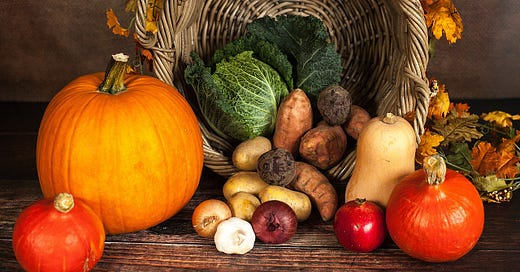What is plant-based?
Bonjour and happy Halloween!
As I was walking through my neighborhood this morning, I couldn’t help but notice how many houses were decorated with pumpkins, ghosts and witches. A lot has changed since I moved to the Netherlands in 1997! Back then, the holiday wasn’t celebrated at all, and I was the only one who had Halloween decorations up. Finding a suitable pumpkin to carve wasn’t easy either in those days! But I always made it a point to observe US holidays, especially when I became a parent. Although I haven’t decorated the house for Halloween since my daughter moved out, I did spend this past weekend watching scary movies with my husband!
It’s hard to believe how fast October flew by; to think that the holidays are right around the corner. I’m really excited to start working on some holiday recipes for the plant-based series I launched last Friday and would like to thank those of you who signed up! Thank you — I’m so happy to have you along! As I mentioned, I will raise my yearly subscription rate to $45 tomorrow, so you can still take advantage of the $30 rate if you sign up today.
Along with much enthusiasm, I received a lot of questions, which I’ve addressed before but would like to clarify in this post.
First of all, plant-based does not mean vegan. Vegans not only exclude all animal products from their diet, but also from their lifestyle. Though a plant-based diet can be vegan, it doesn’t have to be. Plant-based – in my case, whole food plant-based – simply means that most of your diet consists of fruits, vegetables, nuts, seeds and legumes. People adopt this way of eating mainly for health reasons, and in my opinion, that’s a smart move if we consider that the standard diet is robbing us of our well-being and hurting the planet. I should also point out that veganism doesn’t necessarily mean healthy. There are enough vegans whose diet is loaded with processed foods. Not a good thing either. The following article (with handy chart) explains this a bit more: Plant-based diet vs. vegan diet.
In 2014, NYT culinary journalist Mark Bittman wrote The VB6 Cookbook (‘Vegan before 6) with recipes for vegan breakfasts and lunches as well as flexitarian dinners (that call for animal products). After adopting this way of eating, his health dramatically improved. You can read more here. Bittman calls himself a ‘part-time vegan.’
To me, it isn’t about a label, however. It’s about eating in a way that is healthy for us and sustainable for the planet. Truth be told, not everyone will drastically reduce their consumption of animal products the way I have, but I think it’s important for us to be fully aware of what we eat. The fact that most of the animal products consumed in the US (and Europe, for that matter) are factory farmed is quite troubling to me. I don’t think we can shield our eyes from the animal suffering of intensive farming or the effect it has on the planet.
I hope this post has clarified things a bit more, but feel free to write to me with any questions. Have a great week and see you on Friday for a new, plant-based recipe and video!




